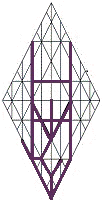חנוך
Enoch

education, schooling, upbringing;
training, indoctrination.
Having shown no remorse for killing his brother Abel, Cain fixed his
attention on the life of his firstborn. The boy would be useful. He
would become a fuller, better projection of who and what Cain saw
himself to be. He calculated that success as a father would tip the
scales of judgment back in his direction, just a little, offsetting any
culpability he might have incurred in the misfortune that befell Abel.
Cain had reconsidered j his
brother’s n
passing
w.
That it had been predictable and almost unavoidable k
held no surprise for him! For some time, now, it had been well
past time
to move on; and by the time young Enoch was born, the enthusiasm j natural
to first-time fathers had twisted within Cain—had metastasized
n—into
a boastful, self-righteous, and self-serving w
arrogance k.
Yes, he had been maligned, shunned, and—yes—ostracized because he had
been the brother who had been marked by the Father’s curse in front of
everybody; but Cain would make amends on his own! He had come to view
j his
son
n
as his own property
w,
his means of public vindication
k;
and he would use him well.
When alone, every now and then, but less frequently as time moved on, he
sometimes wished he could muster w the
strength and fortitude c to
admit a that
he had been—in part, at least, it might be said by some—to blame l;
but before he could take a public step in that direction, he would
require assurance that repentance would end t
the hassles c,
the humiliating o aggravation z!
In this mean time on his own, he would build Enoch!
Early on, young Enoch would be trained to manage the city Cain
envisioned for his posterity. He intended to bury the memory of Abel
under its walls; so it was vital that Enoch’s ascendency in Nod be
legendary. With that goal above any real concern for the boy himself,
Cain remained anxious j;
for he was unwilling to entertain n an
alternative w
to his intentions k.
He could
not fail!
A selfish father, Cain’s relationship j with
Enoch had been nearly hopeless n from
its beginning. Self-promotion w was
the father’s priority, and he needed to spend his time focused on his
own affairs; so he avoided k natural
connections with his son by framing every moment he spent with the lad
in terms of his own needs and expectations. He kept coming back to this
strategy for parenting because he believed it was the right approach.
From Enoch’s birth, the father had been determined to exploit j the
son's energies for his own purposes n.
He made no apologies; but he could sense Adam’s concern, which Cain took
as accusation—a judgment w
that would have to be proven wrong k.
In a moment of unspoken doubt, however, he was surprised o
to realize h
that he‘d grown tired n of
this public charade z,
and of its effects y within
his family b.
Upset by a complicated future, he bitterly g
considered
m his
predicament t
and doubted w
the likelihood c of
his ability a to
control l
all variables—even if they were limited to those that had already
presented themselves. He suspected that, in the future t,
he would not have the wherewithal c
to simply carry on o
with all that would be required of him z.
In Enoch of Nod, residents would not be allowed to question his edicts;
for his rule would strictly override the concerns of lesser men. To
Cain’s recovering senses, Adam's expulsion and banishment n
to Nod had provided him a way of escape w from
the Heavenly Father’s faces; for father Adam had also become tarnished!
He would make use of this opportunity d
by establishing an organizational structure s that
would advance k
and secure d his
legacy w in
Nod.
In the exhilaration of planning ahead, he persuaded himself that the
details of his loss of standing n
because of his fight with Abel had faded, somewhat, which he read as
tacit acceptance w of
his natural inflexibility d:
first, he wasn’t responsible for his nature; and, second, he had not
died after allowing his God-given nature to take its course. Truth be
told, in fact, God was the responsible party.
Should Cain, himself, die in the future (God forbid), his offspring n would
grow to appreciate w his
insights d about
what must follow—well, maybe only about what
might
follow p;
but as for the moment, Cain's decisive d and
unrivaled s
leadership l of
the clan f
was the family's best guarantee y of
a prosperous b way
forward g.
| Irad | ||
| Cain's Family Tree | TrueType Font | |
|
site |
book |